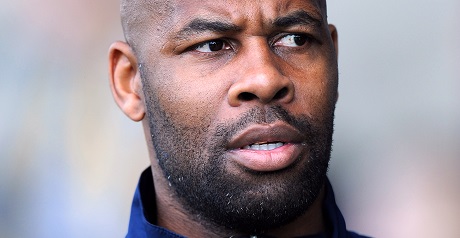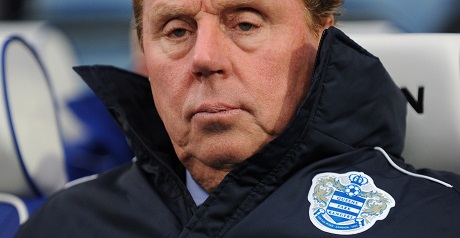Hoddle laid foundations at Chelsea and could do the same at QPR
Glenn Hoddle’s place in Tottenham history is secure and deserved.
A majestic midfielder – as gifted a footballer as has ever graced the English game – Hoddle provided the sort of touch, quality and vision that was sadly all-too lacking in the late ’70s to mid-late ’80s.
If ever a footballer was born in the wrong era, it was Hoddle.
But, whisper it quietly to QPR fans, his impact at Chelsea in later years shouldn’t be underestimated. During three years as manager there he laid the foundations for their growth and subsequent success.
“His steady, sensible building transformed the club. The one he left to become England manager bore very little resemblance to the one he joined.”
Given his credentials, his part-time coaching role at QPR could well be a masterstroke.
It brings the knowhow, tactical nous and expertise many feel have been missing since manager Harry Redknapp lost Steve McClaren to Derby County at the start of last season.
Misgivings about Hoddle’s time at Wolves, and a two-year stint back in north London as Spurs manager, continue to be voiced.
But the success in his first foray into management as Swindon player-boss and then his considerable achievements at Stamford Bridge are a far more sensible legacy by which to judge.
And that is ignoring his three-year spell in charge of the national team and an impressive, albeit brief, stay with Southampton before the lure of Tottenham proved too strong.
Hoddle, whose injury-plagued time in France saw him schooled in the art of management by a certain Arsene Wenger, first trained at Chelsea while he recovered from a career-threatening knee injury.
After turning out for the Blues reserves, he took over at Swindon and having guided the Robins to promotion, he left to join Chelsea in the summer of 1993.
The three years that followed were unremarkable if you simply look at the stats – no trophies and three mid-table finishes.
But his steady, sensible building transformed the club and the one he left to become England manager bore little resemblance to the one he joined.
Here u go. Dream team. pic.twitter.com/L5S9sUNELJ
— Tony Fernandes (@tonyfernandes) August 12, 2014
From diet to training, coaching methods to tactical awareness and preparation, the club were dragged into the modern era.
He was innovative and brave, there were clear signs of progress on and off the pitch, the football was exciting and interesting and he challenged and improved players.
Hoddle made poor players reasonable, average players decent and good players very good.
He gave responsibility to people, picked many you would never have thought were his type of player and got the best out of his team.
It’s no surprise that a whole host of the players on his books arguably peaked during that time.
Eddie Newton, Steve Clarke, Michael Duberry, Frank Sinclair, Gavin Peacock, John Spencer and Craig Burley were just some of the names that flourished under Hoddle.
His first season started badly as the play-football-occasionally-and-only-in-the-right-areas approach was replaced with a brand of football many of the players at his disposal were not able to cope with.
There were notable wins over Manchester United and Liverpool that brought some belief, but at Christmas the Blues were struggling and in serious danger of relegation.

However, come the new year – thanks to Hoddle’s persistence and the fight and spirit of players like Dennis Wise, Erland Johnsen, Clarke and Sinclair and the goals of Peacock – the sweeper system began to pay off
The quality of football was unrecognisable and the purchase of a goalscorer in Mark Stein during the festive period meant that some of the chances started to be taken.
Stein began to score goals, Chelsea avoided relegation with no fuss and reached the FA Cup final. It was huge progress given where the club had been.
In the seasons that followed, Hoddle’s main contribution could be seen, as the quality of players signed steadily improved – each time raising the standards.
He brought stability and efficient and sustainable progress. Hoddle raised the standards, the profile and took the club to the verge of success.
There was an FA Cup final and semi-final appearance and European football that only ended at the last-four stage.
One of the men signed, Ruud Gullit, took over as manager and brought the first silverware in 26 years.

Had you told a Chelsea fan in 1993 that Gullit would sign within a couple of years, it would have seemed insane.
While his 18 months at Wolves, his last managerial job, were labelled a disaster by many, his first season saw Hoddle steer the club away from relegation, to the edge of the play-offs and a club-record 22-game unbeaten sequence that lasted until three games into the following campaign.
That season ultimately ended in huge underachievement and he left before embarking on a second full season. Undoubtedly he is not revered in the Black Country
As a player, Hoddle was a visionary playmaker and how he only ever won 53 caps is a mystery. Had he been Brazilian, he probably would have won 153 and had an entire team built around him.
As a manager, while some have questioned his man-management skills, few have argued with his knowledge.
He certainly made his mark at Chelsea. Now helping Redknapp at another club looking to make big strides – and who knows, maybe eventually succeeding him – his appointment could well turn out to be another significant moment in west London football history.
Follow West London Sport on Twitter
Find us on Facebook

